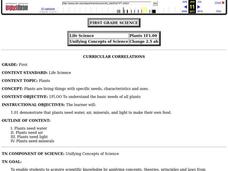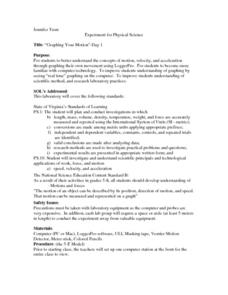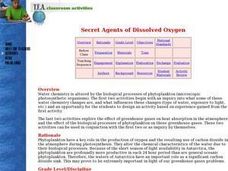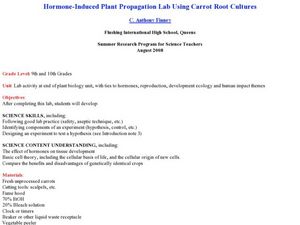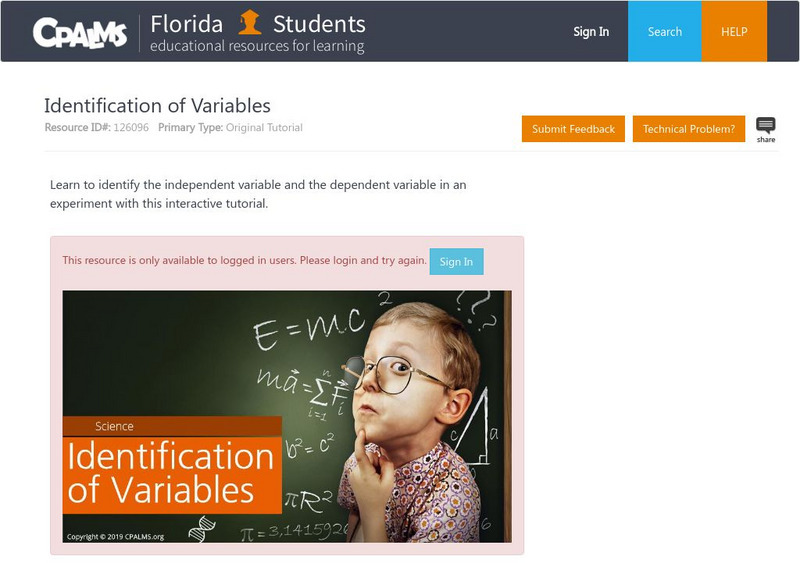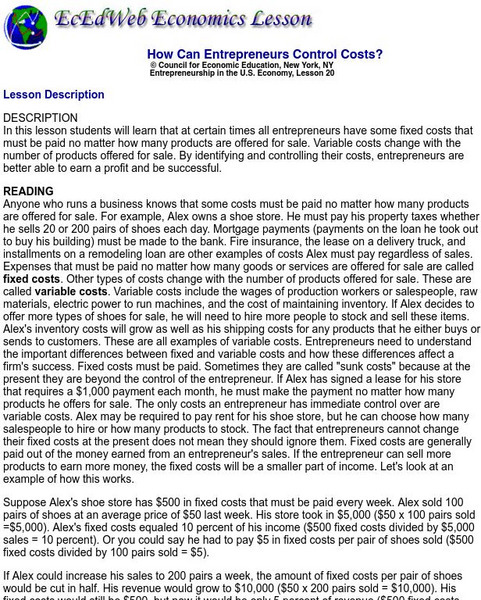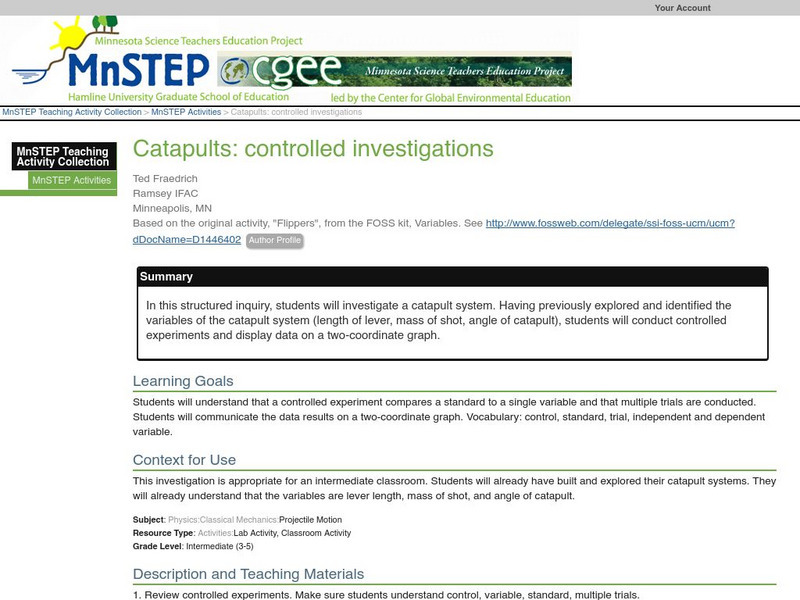Curated OER
Classroom Science Fair Project
Students explore the skills and information needed to complete a science fair project. They follow guidelines to create an document their science fair project.
Curated OER
Plants
First graders explore the specific needs, characteristics, and uses of plants. They discuss the needs of plants as they grow. Students observe plants in various settings as they grow and note the changes they see.
Curated OER
Graphing Your Motion-Day 1
Ninth graders explore the concepts of motion, velocity and acceleration through graphing their own movement using LoggerPro. They become more familiar with the computer technology. Students explore graphing in real time and graph on...
Curated OER
Bungee Man Lab
Students explore the motion of a toy bungee jumper using the scientific method. They view a video of a bungee jumper and discuss what can be measured about a bungee jump. Students discuss the scientific mehtod and how to design an...
Curated OER
Secret Agents of Dissolved Oxygen
Students determine the changes in different types of water in a sealed container over time. They investigate how to measure dissolved oxygen, temperature, and carbon dioxide with calculator or computer probe-ware. Students determine the...
Curated OER
Coulomb's Law
Ninth graders observe the relationship between electrical charge and force. In this electrical charge lesson students experiment and find the quantitative relationship between force and the center to center distance between objects.
Curated OER
Hormone-Induced Plant Propagation Lab using Carrot Root Cultures
Young scholars evaluate the importance of hormones in living things. In this biology lesson, students experiment on carrots to differentiate how humans and plants reproduce. They collect data from experiment to answer analysis questions.
Curated OER
Investigation of Timbre
Students design an experiment to analyze the timbre of different instruments. In this physics lesson, students analyze the missing quality in sound. They discuss their results in class.
Science Buddies
Science Buddies: Scientific Method Variables/hypothesis
Find out what variables are in a scientific investigation and what the difference is between an independent, dependent, and controlled variable. Look at samples of different types of variables and find out what makes a good variable.
American Association for the Advancement of Science
Aaas: Project 2061: Topic: Control of Variables
[Free Registration/Login Required] Create a science test that checks for student understanding in science, for common misconceptions, as well as for correct ideas. This is a list of key ideas related to Control of Variables. For each key...
Biology Corner
Biology Corner: Identifying Variables in an Experiment
Students analyze different experiments to determine independent variables, dependent variables and control groups.
American Chemical Society
Inquiry in Action: Crushing Test
This lab activity will have students crushing crystals to learn about variables and the importance of controlling those variables. Lab activity includes student and teacher instructions.
CPALMS
Florida State University Cpalms: Florida Students: Identification of Variables
An explanation of how dependent and independent variables are used during experimentation.
Sophia Learning
Sophia: Independent/dependent Variables: Lesson 2
This lesson will explain the difference between independent and dependent variables. It is 2 of 4 in the series titled "Independent/Dependent Variables."
Sophia Learning
Sophia: Independent/dependent Variables: Lesson 3
This lesson will explain the difference between independent and dependent variables. It is 3 of 4 in the series titled "Independent/Dependent Variables."
Annenberg Foundation
Annenberg Learner: The Control a Haber Bosch Ammonia Plant
An activity where students try to optimize profits by producing the largest daily output of ammonia by simulating the Haber-Bosch process. Students will use their knowledge of equilibrium reactions and the effects of variables like...
TeachEngineering
Teach Engineering: Mint Mobiles
Students design, build and test model race cars made from simple materials (lifesaver-shaped candies, plastic drinking straws, Popsicle sticks, index cards, tape) as a way to explore independent, dependent and control variables. They...
Sophia Learning
Sophia: Control and Variable Groups: Lesson 3
This lesson will explain the difference between a control group and variable groups, when using the scientific method. It is 3 of 4 in the series titled "Control and Variable Groups."
Sophia Learning
Sophia: Control and Variable Groups: Lesson 4
This lesson will explain the difference between a control group and variable groups, when using the scientific method. It is 4 of 4 in the series titled "Control and Variable Groups."
Sophia Learning
Sophia: Control and Variable Groups: Lesson 1
This lesson will explain the difference between a control group and variable groups, when using the scientific method. It is 1 of 4 in the series titled "Control and Variable Groups."
University of Nebraska Omaha
Ec Ed Web: How Can Entrepreneurs Control Costs?
This economics lesson explores what influences producers to supply in regard to demand. It examines fixed and variable costs, how such costs can be reduced, and how they influence production. Includes printable worksheets.
Science Education Resource Center at Carleton College
Serc: Catapults: Controlled Investigations
In this structured inquiry, students will investigate a catapult system. Having previously explored and identified the variables of the catapult system (length of lever, mass of shot, angle of catapult), students will conduct controlled...
TeachEngineering
Teach Engineering: Are You in Control?
This lesson teaches the engineering method for testing wherein one variable is changed while the others are held constant. Students compare the performance of a single paper airplane design while changing the shape, size and position of...
McGraw Hill
Glencoe Publishing: Practicing Scientific Processes
This site from Glencoe Publishing not only explains hypothesis but also tells how to design an experiment to test your hypothesis. Includes the difficult task of "Separating and controlling variables."



